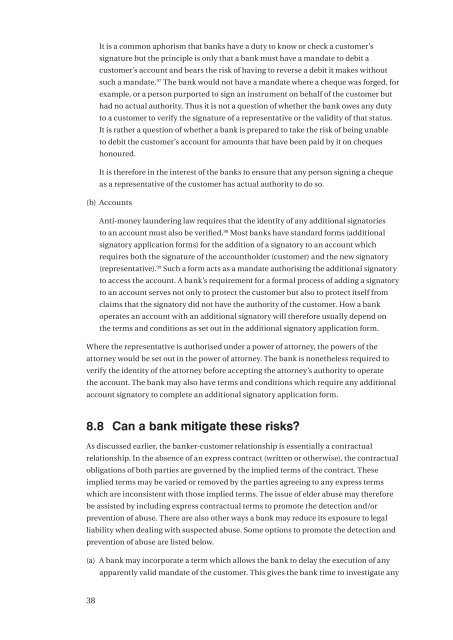Responding to the financial abuse of older people - Loddon ...
Responding to the financial abuse of older people - Loddon ...
Responding to the financial abuse of older people - Loddon ...
- No tags were found...
Create successful ePaper yourself
Turn your PDF publications into a flip-book with our unique Google optimized e-Paper software.
It is a common aphorism that banks have a duty <strong>to</strong> know or check a cus<strong>to</strong>mer’s<br />
signature but <strong>the</strong> principle is only that a bank must have a mandate <strong>to</strong> debit a<br />
cus<strong>to</strong>mer’s account and bears <strong>the</strong> risk <strong>of</strong> having <strong>to</strong> reverse a debit it makes without<br />
such a mandate. 97 The bank would not have a mandate where a cheque was forged, for<br />
example, or a person purported <strong>to</strong> sign an instrument on behalf <strong>of</strong> <strong>the</strong> cus<strong>to</strong>mer but<br />
had no actual authority. Thus it is not a question <strong>of</strong> whe<strong>the</strong>r <strong>the</strong> bank owes any duty<br />
<strong>to</strong> a cus<strong>to</strong>mer <strong>to</strong> verify <strong>the</strong> signature <strong>of</strong> a representative or <strong>the</strong> validity <strong>of</strong> that status.<br />
It is ra<strong>the</strong>r a question <strong>of</strong> whe<strong>the</strong>r a bank is prepared <strong>to</strong> take <strong>the</strong> risk <strong>of</strong> being unable<br />
<strong>to</strong> debit <strong>the</strong> cus<strong>to</strong>mer’s account for amounts that have been paid by it on cheques<br />
honoured.<br />
It is <strong>the</strong>refore in <strong>the</strong> interest <strong>of</strong> <strong>the</strong> banks <strong>to</strong> ensure that any person signing a cheque<br />
as a representative <strong>of</strong> <strong>the</strong> cus<strong>to</strong>mer has actual authority <strong>to</strong> do so.<br />
(b) Accounts<br />
Anti-money laundering law requires that <strong>the</strong> identity <strong>of</strong> any additional signa<strong>to</strong>ries<br />
<strong>to</strong> an account must also be verified. 98 Most banks have standard forms (additional<br />
signa<strong>to</strong>ry application forms) for <strong>the</strong> addition <strong>of</strong> a signa<strong>to</strong>ry <strong>to</strong> an account which<br />
requires both <strong>the</strong> signature <strong>of</strong> <strong>the</strong> accounth<strong>older</strong> (cus<strong>to</strong>mer) and <strong>the</strong> new signa<strong>to</strong>ry<br />
(representative). 99 Such a form acts as a mandate authorising <strong>the</strong> additional signa<strong>to</strong>ry<br />
<strong>to</strong> access <strong>the</strong> account. A bank’s requirement for a formal process <strong>of</strong> adding a signa<strong>to</strong>ry<br />
<strong>to</strong> an account serves not only <strong>to</strong> protect <strong>the</strong> cus<strong>to</strong>mer but also <strong>to</strong> protect itself from<br />
claims that <strong>the</strong> signa<strong>to</strong>ry did not have <strong>the</strong> authority <strong>of</strong> <strong>the</strong> cus<strong>to</strong>mer. How a bank<br />
operates an account with an additional signa<strong>to</strong>ry will <strong>the</strong>refore usually depend on<br />
<strong>the</strong> terms and conditions as set out in <strong>the</strong> additional signa<strong>to</strong>ry application form.<br />
Where <strong>the</strong> representative is authorised under a power <strong>of</strong> at<strong>to</strong>rney, <strong>the</strong> powers <strong>of</strong> <strong>the</strong><br />
at<strong>to</strong>rney would be set out in <strong>the</strong> power <strong>of</strong> at<strong>to</strong>rney. The bank is none<strong>the</strong>less required <strong>to</strong><br />
verify <strong>the</strong> identity <strong>of</strong> <strong>the</strong> at<strong>to</strong>rney before accepting <strong>the</strong> at<strong>to</strong>rney’s authority <strong>to</strong> operate<br />
<strong>the</strong> account. The bank may also have terms and conditions which require any additional<br />
account signa<strong>to</strong>ry <strong>to</strong> complete an additional signa<strong>to</strong>ry application form.<br />
8.8 Can a bank mitigate <strong>the</strong>se risks<br />
As discussed earlier, <strong>the</strong> banker-cus<strong>to</strong>mer relationship is essentially a contractual<br />
relationship. In <strong>the</strong> absence <strong>of</strong> an express contract (written or o<strong>the</strong>rwise), <strong>the</strong> contractual<br />
obligations <strong>of</strong> both parties are governed by <strong>the</strong> implied terms <strong>of</strong> <strong>the</strong> contract. These<br />
implied terms may be varied or removed by <strong>the</strong> parties agreeing <strong>to</strong> any express terms<br />
which are inconsistent with those implied terms. The issue <strong>of</strong> elder <strong>abuse</strong> may <strong>the</strong>refore<br />
be assisted by including express contractual terms <strong>to</strong> promote <strong>the</strong> detection and/or<br />
prevention <strong>of</strong> <strong>abuse</strong>. There are also o<strong>the</strong>r ways a bank may reduce its exposure <strong>to</strong> legal<br />
liability when dealing with suspected <strong>abuse</strong>. Some options <strong>to</strong> promote <strong>the</strong> detection and<br />
prevention <strong>of</strong> <strong>abuse</strong> are listed below.<br />
(a) A bank may incorporate a term which allows <strong>the</strong> bank <strong>to</strong> delay <strong>the</strong> execution <strong>of</strong> any<br />
apparently valid mandate <strong>of</strong> <strong>the</strong> cus<strong>to</strong>mer. This gives <strong>the</strong> bank time <strong>to</strong> investigate any<br />
38
















